Molweni bethuna, abant’ endihleli nabo aph’ estudio.
Molweni my brethren, people with whom I am here in the studio.
Ndibulel’ ubukho benu, ukuba manibe lapha kum.
I thank your presence, for you to be here with me.
Bekukubi kakhulu.
It has been very bad.
Ndith’ E Nkosi!
I say E Nkosi.
Kuthe aph’ enhlizweni, kungangeni nokudla.
It was here in my heart, I could not even eat food.
Ndingazazi nokuba mandithini.
I did not know even what to do/say.
NdinguMantombi, kaMathothiyana, ifani yami.
I am Mantombi of Mathothiyana, my surname.
KuTsolo, kuJence.
Of Tsolo, in Jence [village].
Ndiyintombi kaSidaphu, ngutata wami lowo.
I am daughter to Sidaphu, who is my father.
Intombazan’ endizalayo nguNyawuza nguThahla nguHlambangobubende.
The girl that gave me birth is of Nyawuza, Thahla, [and] Hlambangobubende.
Yintombi kaNonjingana uzalwa nguNonjingana
She is the daughter of Nonjingana, born to Nonjingana.
KuMagutshwa, apho ikhoyo inkaba kamamami.
From Magutshwa, where her umbilical cord is.
Waze wakwendela kuJence.
She got married in Jence.
Waze wathola lentombazana kuthiwa nguMantombi.
She then gave birth to a girl called Mantombi.
Sibabini, nginguMantombi noSilungwana.
There are two of us, I am Mantombi with/and Silungwana.
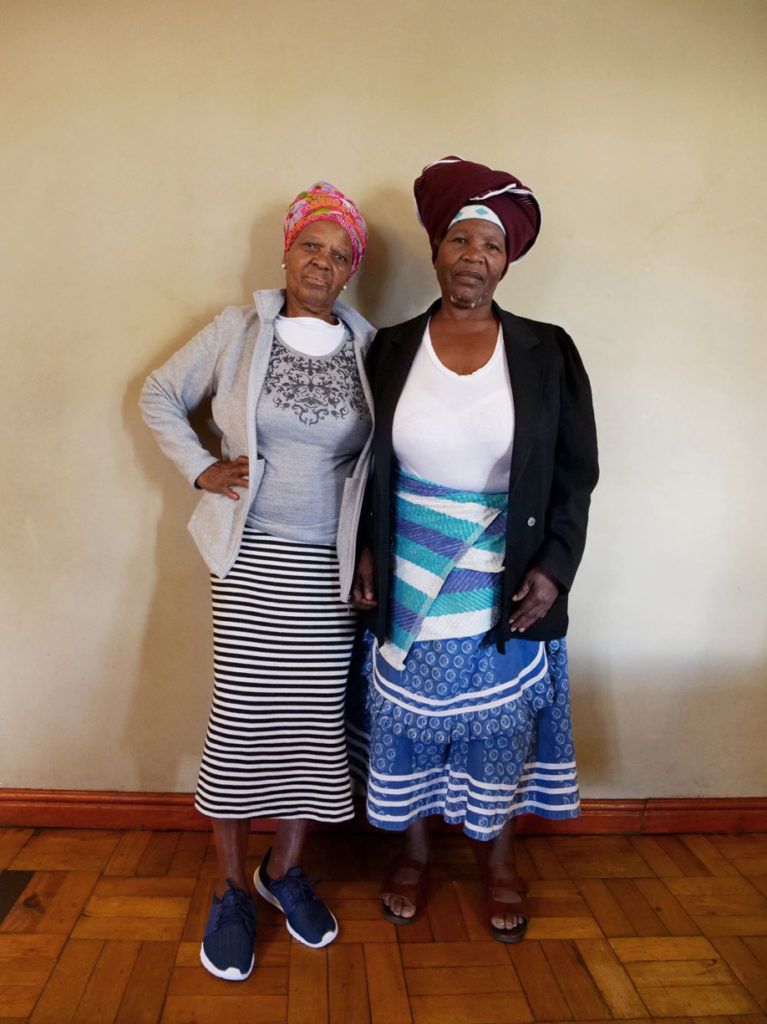
Kwenzeke umqa
Good fortune happened [to me]
Ondingawaziyo ukuba wenzeka kanjani
Of which I know not how it happened
Ndandisemqombothini
I was at a beer dance gathering
Njengoba sendilapha ndithetha embokweni
As I am here talking on the megaphone
Ndandingazazi ukuba ndingaze ndithethe
I never knew I would ever talk
Ndibe lapha kulendawo ndifakwe kuyo namhlanje
And be here in this place I have been put in
Ndinovuyo elizisa neenyembezi apha kum
I have joy that brings tears to me
Ndandingayilindelanga kakhulu lento iye yandifikela
I never ever expected what has come to me
Kungehli nobuthongo
Even sleep would not come
Ndathathwa ngumfana Omncincanana
A young boy took me
Ondingayaziyo uba umnt’ ebebuyiswa
If only I knew how to bring the dead back to life
Ngendimbuyisa umzali wakhe uZungulu
I would bring back Zungulu’s parent
Isihlobo sikaNcele sikaMchorhana
The relative of Ncele of Mchorhana
SikaTeketekana sikaPhangelilanga
Of Teketekana of Phangelilanga
Akekho umntu, ndinabantwana
There is no one; I have offspring of my own
Kodwa umntwana wami NguZungulu
Nevertheless, Zungulu is my child
Ngoba wandithwala ndikulendawo-nje
Because he carried me to this place
Ndikulendawo-nje sendiwohloka ndiwohloka
In this place getting old and worn out
Wandithatha ndingekawohloki
He took me away before I was worn out
Ndiphangelela abantwana bami
Working for my children
Ndiyabulela ukuba nizondenzela lelicwecwe
I thank you for making me this album

Elicwecwe enda ndingalilindelanga
This album that I did not expect
Bendingasalindelanga kwanto!
I was not expecting anything
Ndithi kulal’ umnyama
I say darkness take its leave
Kuvele ukukhanya kuni
And light comes to you
Ndithi ‘E Nkosi!’
I say ‘ENkosi’
Kum kukubi
To me it was bad
Kwakukubi kum bantwana bam
It was bad with me my children
Kwakukubi kum!
It was bad with me!
Wandonyula lomntan’ alomfazi
This child of woman rescued me
Ungu Zungula Dizu
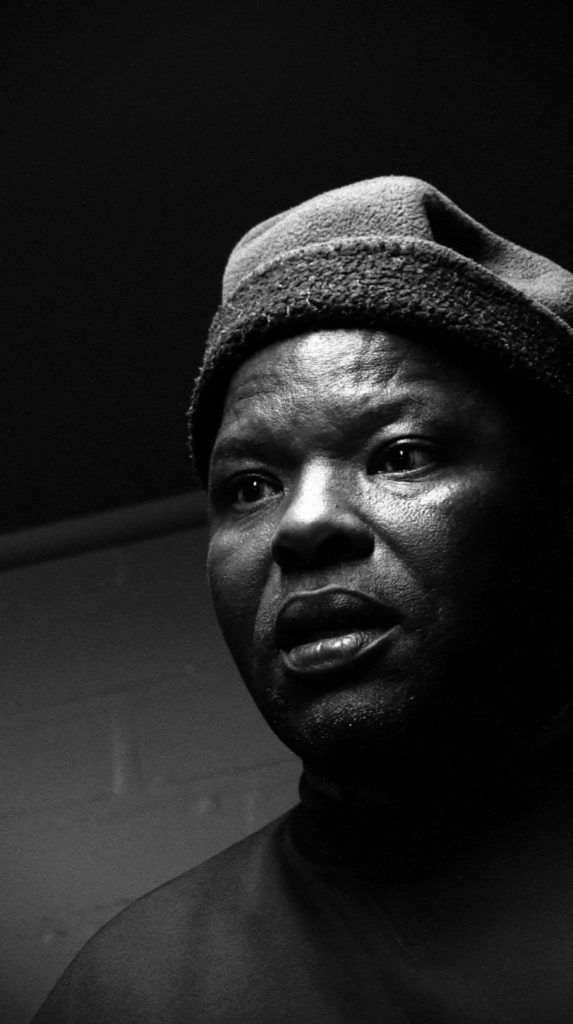
He is Zungula Dizu
Ohlala kwaLanga
Who lives in Langa
Mina apho ndikhoyo ndise Samola
The place where I am is Samora [Machel]
Ikhaya lami likuJence
My home is at Jence, in Tsolo
NdinguMantombi igama lami
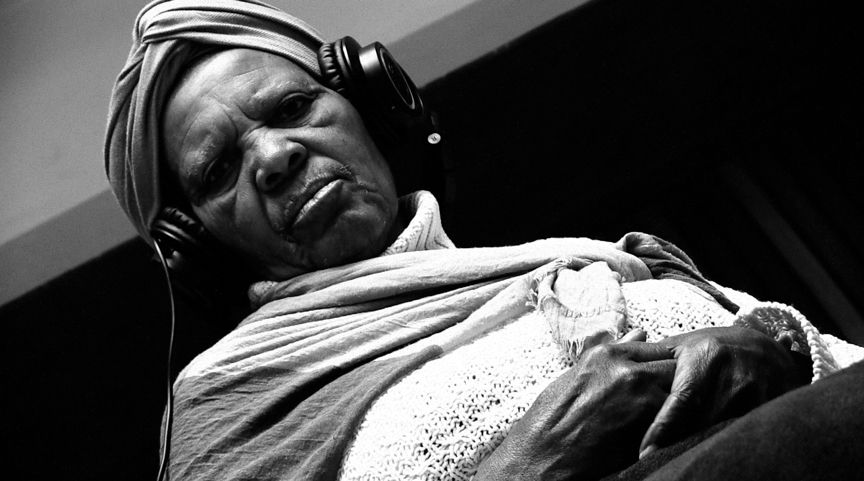
My name is Mantombi
I ‘van’ ngeyakwa Mathothiyana
My surname is Mathothiyana
Ndiwahambil’ amazwe
I have travelled to lands
Azang’ ahanjwe nangabany’ abantu
Where other people have not been
Ndingu mpampampa ndinje
Indigent as I am
Ndiwahambil’ amazwe
I have travelled in countries
Akukho neliny’ ilizwe laphesheya endingalaziyo
There is not a single country overseas I do not know
Uma bendifundile ngendiwabiza ngamagama
If I were learned, I would call out each by name
Inton’ andifundanga kodwa
The thing is I am not learned
Akukho neny’ indawo engingazange ngiyinyathele phesheya
There is not a single place I did not step on abroad
Ndikhwel’ i-olopleyini
Boarding aeroplanes
Ndikhwel’ ezabelungu ndilale ngomqolo
Riding the whites’ own and lie on my back
Ndilale phansi ndiyofik’ apho ndiya khona
Laying down until I arrive where I am going to
Ndithi kuZungulu ‘ENkosi Dizu’
I say to Zungulu ‘ENkosi Dizu’
Noba ayikafiki leyonto
Even as that thing has not come out yet
‘E Nkosi ukuzondibeka kulendawo
E Nkosi for bringing me to this place
Okuzondibeka kulendawo Zungula Dizu
For placing me here Zungula Dizu
Ncele! Nduna! Mqhorhana!
Ukuzondibeka kulendawo ondibeke kuyo
For putting me in this place as you have
Ngoba uma wenz’ into uyinto yokuhlekisa
Because when you do something, you are a laughing stock
Kubuzw’ uba ‘Lent’ oyenzayo iyawuda ibe yintoni?’
It is asked ‘Whatever will come of this that you’re doing?’
Kodwa mina bendiphilil’ aph’ emphefumlweni
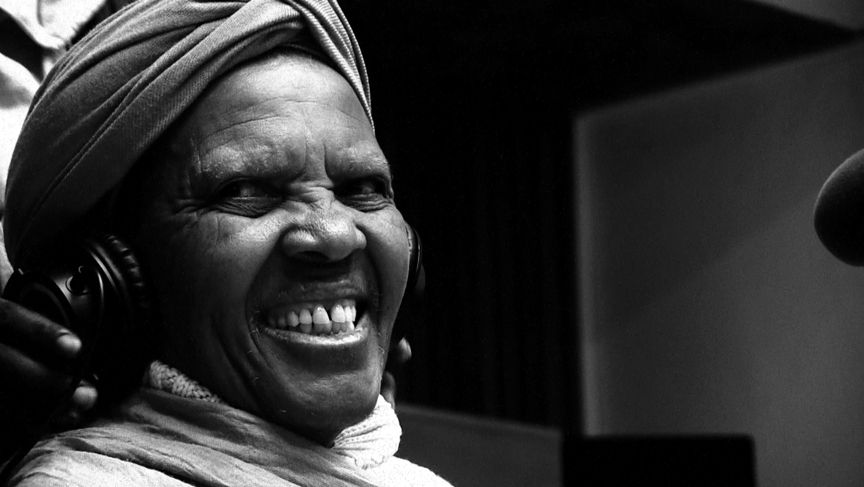
However, for me it was all well here in my soul
Ngoba ndilala ndidlile
Because I went to sleep having eaten
Ngoba nanamhlanje ndilala ndidlile
Even today, I still go to bed having eaten
Ndithi sendilele ndilidwangu nabantwana bami
When I am sleeping with my children
Bamazi ingunyana wami nabantwana endibazalayo
Even the children I gave birth to know him to be my son
Ndibazala kum bathi
Those whom I gave birth to say to me
Ngunyana wakho uZungulu
Your son is Zungulu
Ngoba ungaphezulu nakuthi
Because he is above all of us
Ngok’ kwenzela yonk’ into
In doing everything for you
Ndibulela kwaba bantu
I thank these people
Bapheth’ ezinsimbi zabelungu
Who handle these machines of the whiteman
Into abandenze yona
What they have done for me
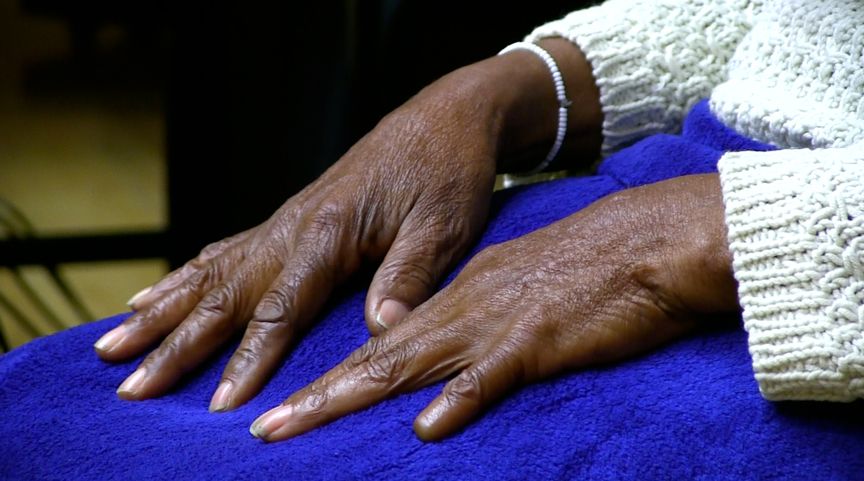
Ndiphil’ emphefumlweni
I am healed in my soul
Ndisebenza nabo kammandi bantwana bam
I enjoy working with them my children
Ndonwabile namhla ndonwabile
Happy today I am happy
Ndandingazi ukuba ndingaze ndizohlala kulendawo
I never knew I would ever come to sit in this place
E Nkosi.
To follow and appreciate the bearing of repertories recorded by Mantombi Matotiyana in this album it is necessary to understand something of her story – of which literal translation I have attempted above.
Ukulandeleka ngokucacile kwencazelo yalezizingoma eziqoshwe ngu Mantombi ka Mathothiyana kulelicwecwe kudinga kwandulelwe ukuqonda okuthize ngakulandisayo ngempilo yakhe – nengizamile ukukuhumusha ngasenhla.
The songs in this album sound inseparable from Matotiyana’s narrative of a torturous path in life, and one that has – to her own astonishment – led her into the recording studio, as she remarks, “Ndandingazi ukuba ndingaze ndizohlala kulendawo” (I never knew I would ever sit in this place).
Ukuzwakala kwezingoma ezikulelicwecwe akwehlukaniseki nokulandwa nguKaMathothiyana ngokungamagwingci kwempilo, nethe – ekummangaliseni yena luqobo – yaphetha ngokumholela ezindlini zokuqopha, njengoba ephawula ethi, “Ngangingazi ukuthi ngiyoze ngihlale kulendawo”.
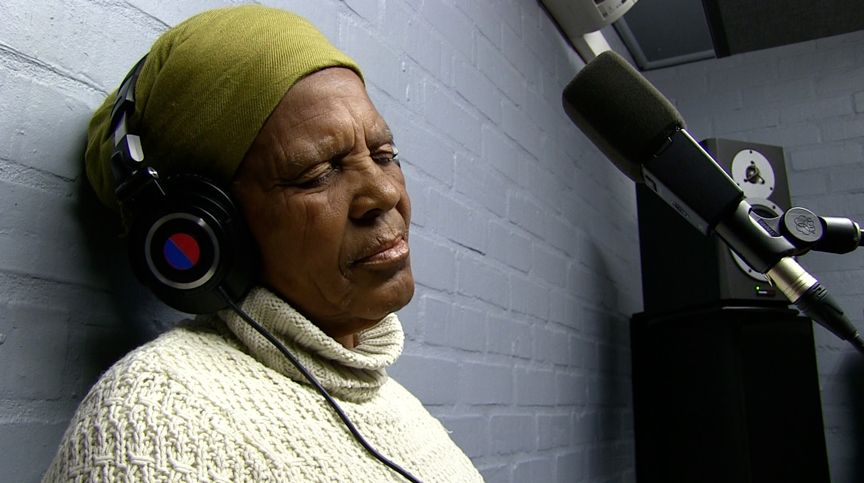
Evidence of a mortal, personal strife is conveyed in both fact and metaphor interwoven with ‘her story’, which she narrates in a symbolic oralism of bow self-accompaniment and acapella repertoires. Deeply embedded in the secularity of repertoire selected, individual experiences of tragedy and privacy of pain are rendered accessible to all who share her heritage and its ethnic framing in African historical subjectivities to power.
Ubufakazi ngempilo budumbu ehlukumezayo buyavela ekufanekiseni nasemidantini okwelukelwe egodeni lempilo yakhe, nayilanda ngobuciko bekhono lokufanekisa ngokuhlabelela nokuziphelekezela iphimbo ngogobe. Okucashiswe ukucashunwa kwalezingoma phakathi kwezaziwayo nezejwayelekile yikusondezeleka – emizweni yalabo ahlanganyela nabo endabukweni yakhe nebophezeleke emlandweni wokuphathwa kwabantu base-Afrika ngamandla abokufika – kwezinzwa zokuhlangabezana nezigameko eziletha umunyu kumuntu engayedwa kanye nemfihlakalo yobuhlungu,
Themed within a narrative vein of the simultaneously contingent and historical – several songs lament the repercussive context of Xhosa male industrial labour migrancy. In this frame, heritage takes significant definitions from traditional conceptions of family and, precisely, its disruption. Beyond the poetic charm of song, hypnotic bowstring tones and story singing starkly lurks the culpability of migrancy, its imperatives and consequences in the structural continuum of poverty, traditional patriarchy and capital power.
Ngokuqoqeka kwazo ekulandiseni ngokusematheni nokungumlando kanyekanye – isigejane salezingoma ziyisikhalo ngesimomthelela esalethwa ukushiywa kwemizi yawo ngamadoda amaXhosa ukuyothengisa ngamandla okusebenzela imali. Ngokubuka ngalentuba ukugcizelelwa kobumqoka bamagugu endabuko kususelwa ekubumbekeni komndeni wakudala osikweni, empeleni ukuchithakala kwawo. Okusithwe yibumbongi bengoma, umnkenenezo wentambo olobelisa ingqondo kanye nenkondlo, kuwunyelele lwesiphambuko sokuntunta nokuyimbangela nomphumela kwako okubandakanye ukweswela, amandla osiko lobulisa kanye namandla obungxiwankulu.
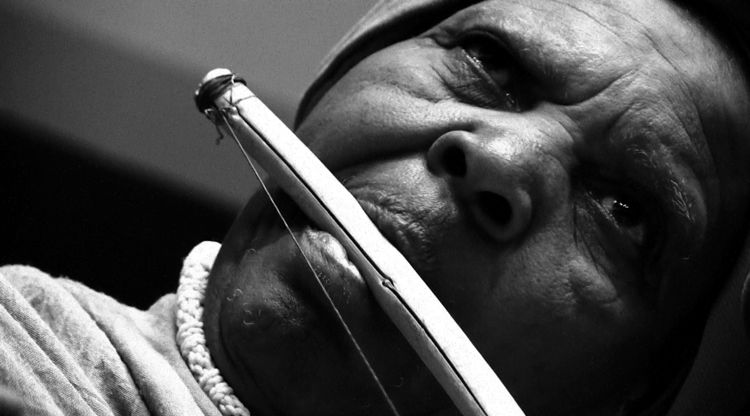
Matotiyana’s opening track Wachithek’ Umzi Wendoda provides a ruminant, lucid summary on a perennial issue defining southern African political economic history and the present. As a term of reference a ‘breaking up’ – of the homestead in this instance – connotes faint hopes of reparation. Here however, the singer broods graphically on the catastrophe as ukuchitheka (‘spillage’) – a permanently irreversible misfortune due to the liquid material nature of the substance of reference. If it were a potful of tantalizing beer amid a circle of elders in court being instantly soaked up in the parched village dust on the ground, a cherished ceremony summarily disbands and its memory is forever tarnished. Architectural metaphors abound in the Eastern Cape’s historical domestic narratives such as ukudilika (lit. ‘falling apart’) of a man’s built umzi (‘family homestead’).
OKaMathothiyana uvula inkundla ngomucu othi Wachithek’ Umzi Wendoda ukubeka kafushane ngeliva elingabangulekiyo elingumlando nemanjena lezombangazwe ngokomnotho kwelase-Afrika ewukayo. Ngokwencazelo ‘ukwahlukana phakathi’, nokuqondiswe kokwekhaya kulenkulumo, kunokukhomba inhlasana yethemba lokubuye kubuyelane esimweni. Kepha-ke lapha amadlinzo omhlabeleli lenhlekelele yesigameko ayifanisa njengo ‘kuchitheka’ – nokuyilishwa elingaguquleki ekwehleni kwalo nanjengoba isimo sento okukhulunywa ngayo lapha siluketshezi. Uma bekungaba lunqambothi lokhamba lotshwala obelubekwe esikokeyaneni sawokhandampemvu ebandla nosebumunciwa zintuli zomuzi phansi emhlabathini, lokho kungukuphela kanjalo komcimbi noligugu obekuhlangenwe ngawo, nonkumbulo yawo isiyobanjalo ingeyendumalo.
Matotiyana’s Wachithek’ Umzi Wendoda clearly reinforces western Pondoland family narratives we are similarly reminded of in one other regional secular song, Wadilik’ Umzi KaMzwandile, that has also been adapted for musical bow accompaniment. Another relatively popular song from Xhosa beer repertoires among those that have been documented in the course of musicological research activity is Wen’ UseGoli (‘You Who Are in the Reef’). Characteristically interpreted as a mirthful admonition towards ‘deserting husbands’, in this album however Wen’ UseGoli adds potently to a protracted lament of domestic demise. Its inclusion in this suite well deserves a literal reading of its lyric as “you, who are in the ‘burg of Johannes’, will eat things cold”. If such dishes, as they do, include one’s wives, this is indeed how “[u]chithek’ umzi wendoda” – a man’s home falls apart.
EKoloni zandile izisho eziphathelene nesakhiwo sendlu emilandweni yemikhaya, njenga noku ‘dilika’ komuzi wendoda wakhiwe. Ingoma kaMatotiyana ethi Wachithek’ Umzi Wendoda eKoloni igcizelela imilando evamile yemindeni yasemaMpondweni, nesiyikhunjuzwa kaninginingi nangezinye izingoma zakulendawo ezifana nenye eyaziwayo ethi Wadilik’ Umzi KaMzwandile – neseyenyuleka ngokuhlatshelelwa iphelezelwa zingobe zesiXhosa ezahlukeneyo (njengamahadi nemirhubhe). Enye yemicu eseyejwayelekile endlebeni kwezesiXhosa zasetshwaleni – nesithole ukusabalaliseka kulandela umsebenzi wokucwaningo oluphakeme ngengoma – yileyo ethi Wen UseGoli.
Kuqhelekile ukuzwa lengoma njengencokola ngesimo samadoda abalekela imizi kepha-ke kulelicwecwe lengoma ethi Wen’ UseGoli isashubisa ukugcizelela isikhalo ngokuchitheka kwemizi nemindeni. Ukungena kwayo kuloluhla lwezingomazikhalo eziqukethwe kufanelwe ukuthathwa ngokuhlonzile njengesexwayiso esithi bukhoma nokusho “Loyo mlisa okwaNdongaziyaduma mhla egodukayo uyokufica sekade kwaphola ukudla kwakhe”. Nebala uma ngabe izidlo lezo zibandakanya nondlunkulu bakhe, sekuyobe kuyikho ‘ukuchitheka komuzi wendoda’.
In the singer’s experience, the gendered torment invariably encountered within a patriarchal, polygamous marriage also looms large among root causes of domestic erosion as the errant male partner is emphatically indicted:
Lent’ ihamb’ isenda (This thing goes around marrying)
[I]yeke lent’ uyenzayo (Quit this that you are doing)
Ngokwazi komhlabeleli, ukuhlukumezeka ngobulili nokuvamise ukwelanyelwa ngabesifazane esimweni sokushadela esithenjini, kungesinye sezisusa eziqavileyo kwezikhandla ubumbano emndenini, njengoba ezwakala ehlabelela kulengoma ephindaphinda ukunokondisa ukukhononda anakho ngesenzo esingumkhuba wowesilisa abambisene naye emendweni lapho ethi:
Lent’ ihamb’ isenda
[I]yeke lent’ uyenzayo
Xel’ Int’ Omke Ngayo (‘tell us why you left’) reprises both the interrogation – whether in conscience form or in a court of judgment – and the extenuating circumstances in defence of ‘departure’ as abandonment of parental responsibilities to offspring and family. Vilified in gossip and scornfully ridiculed, the conflicted yet dutiful co-wife elected to depart only after the harvest:
Ndatshiy’ abantwana nombona (I left the children with mealies)
Ndatshiy’ amatanki enombona (I left silos filled with mealies)
Umucu othi ‘Xel’ Int’ Omke Ngayo’ uzikhumbuza ngokubuzeka – kunembeza noma esigcawini sokuthetha amacala – kanye namabhaxa okuziphungela ekushushisekeni ngokubalekela izibophezelo zobuzali zokubhekelela abantwana nomndeni. Ngokunyundelwa ngenhlebo nokuthunazwa yikuklolodelwa, yize noma wayengumuntu ozimiselayo, ngokuxakaniseka kwakhe owesifazane wanquma ukuhamba ngokuphela kwekwindla sekuqediwe nokuvunwa kwamasimu:
Ndatshiy’ abantwana nombona
Ndatshiy’ amatanki enombona
Majola, the final braid to Matotiyana’s weave of songs of domestic rupture, decries a long-term imprisonment of the male head of a family. Were he released from prison, not only would Majola’s favourite meals likely have gone wen’useGoli ice-cold, he would also find a wife overwhelmed by complications ‘in [by now] her homestead’.
Ingoma ethi Majola – neyigoda lokuphethaimbenge ezingomeni zikaMantombikaMathothiyana eziyisililo ngokuhlakazeka komndeni – yona ibalisa ngokuboshwa kade kwenhloko yomuzi. Uma kungehla uMajola adedelwe ejele, akungukudla kwakhe kuphela osekwaphola ‘wen’useGoli’, uyokwelamela inqabakayitshelwana kuxabene ubendle, umkakhe ekhungethwe zinkinga zomuzi ‘osekungowakhe’.
In terms of orchestration alone the songs Molweni, Kubuhlungu Ukugula and Umoya Uthethile are first rendered on umrhubhe and then with voices. In this, all three songs highlight choirism as a social performance heritage with deep roots in indigenous southern African musical performance traditions. This is particularly remarkable of Xhosa music, where individual voices creatively contribute their musical, discursive and improvisational independence in a sociomusical performance of a song based on a mutually understood philosophical idea. Together all three songs affirm individual artistry in umrhubhe such as accomplished in Mantombi Matotiyana, as uniquely disposed in musically demonstrating the complexity of form, tonal, temporal and spatial relationships as elements characteristic of traditional Xhosa choral music.
Ngokuhleleka komculo, izingoma ezithi Molweni, Kubuhlungu Ukugula kanye nalena ethiwa Umoya Uthethile ziqalwa ngomrhubhe, zithi ukuphetha zihlatshelelwe ngamaphimbo odwa.Yontathu lemicu ikhombisa amaphimbo okuhlabelela njengasemsukeni wendabuko yamasiko okuhaya nokugida ingoma e-Afrika yonke ewukile. Lokhu kuphawuleka ngokucacile ngamaXhosa, ekutheni iphimbo ngalinye lihlanganyela namanye ngobuciko ekwakhekeni kwengoma nedlulisa imbumba yokubona ludabathize ngasolinye. Kulezingoma zontathu uMantombi kaMathothiyana ugqamisa ubungoti bokudlala umrhubhe njengobukhethekile ekukhombiseni ubunyoninco bokubumbeka kwesimo sengoma, nokungesididiyele iminkenenezo nanezigqi okunhlobonhlobo. Lenkambiso yonke ifunganyeleke ekuhlelekeni nkanthinye noma ngokulandelana kwezenzeko okwenzeka enhlanganyelweni yokuhaywa, ukubethelwa, nokusinwa ngokosiko kwengoma yesiXhosa sendabuko.
Kubuhlungu Ukugula and Umoya Uthethile, both address themselves to spiritual calling in its African indigenous religious context. Incurable illness is recognized as a symptom indicating to a subject to undergo ukuthwasa initiation towards ubungoma, or divining. In Kubuhlungu Ukugula, the singer expresses an intimate experience of pain associated with the calling to be sangoma as she sings… ‘You, who has never experienced it, it is painful to be sick’.
Umbiko walezingoma ezimbili, uKubuhlungu Ukugula no Umoya Uthethile, uphatha ubizo lobungoma lwemimoya yabaphansi noma amathongo njengokwenkolelo yendabuko yama – Afrika. Ezinye zezimpawu eziqavile zokubizelwa ebungomeni yikugula kobiziwe ngesifo esingalapheki ngezaba ezejwayelekile. Enkolelweni ngamathongo lokhu kugula kuthathwa njengomyalezo kulowo ophathekileyo wokuthi udinge ukwethwasela ubungoma ukuze elapheke. Lapho umhlabeleli ethi Kubuhlungu Ukugula uzwakalisa ulwazi analo yena bukhoma ngokugula okuhlotshaniswa nokungenwa idlozi nxashana ethi… “Wena ongakwaziyo, kubuhlungu ukugula”.

Another path of initiation followed by would-be diviners involves travelling on foot for long distances while in a trance state – after receiving ‘messages’ from spirits that appear in dreams. The chosen subject then leaves home to walk to wherever they are led by a spiritual ‘voice’ only they can hear –
Umoya Uthethile [The spirit has spoken]
[Umoya] uyayazi lendlela [The spirit knows this path]
Omunye wemigudu ethathwa ngoqokeleka umsebenzi wokuthwasela ubungoma bedlozi, yikuthatha uhambo olude ngezinyawo, nomhambi walo asuke engalwazi ukuthi lubhekephi nanokuthi isiphetho salo sikuthini. Loluhambo lwandulelwa ngumyalezo wamazwi azwiwa ngokhethekile kuphela noma ufike kuye ngesimo sephupho lithize lapho elele. Lowo-ke uba eseshiya ikhaya ehamba elibhekisa lapho umoya wethongo omyalela khona nendlela yokuhamba ngemfihlo yokwazi kwawo kulandela lokho osuke ‘usukukhulumile’ kuye. Yikho-ke lokhu okunokuqondeka ngengoma kaMantombi kaMathothiyana esihloko sayo sithi Umoya Uthethile.
Umoya Uthethile
[Umoya] uyayazi lendlela

In fitting with the previous two songs, the solo acapella rendition Vukani takes the form of a prayer summoning an ancestral spirit to manifest in its power. It is in the realm of divining – wherein a medium seeks the attention or ‘wakefulness’ of spiritual guides whom the singer here beseeches with the words ‘even as you may be asleep, arise and be in charge’. Part of a séance in the diviners’ practice, the chant pleads for enlightenment of the mortal spiritual medium, to enable them to give counsel, divine on behalf of or heal a suffering subject. The tone of the piece emanates from a humble position of an individual who – in being summoned onto the path of divining – is thereby charged with a burdensome spiritual responsibility. When the burden becomes too overwhelming to bear alone, the acolyte cries out for intervention by spiritual elders, ancestors who are reverentially considered and respectfully referred to as ‘those who are asleep’.
Ngenkulumo yayo engeyokuthetha amadlozi ukuziveza amandla awo phezu kwabaphilayo, ingoma yoKaMathothiyana yephimbo elilodwa ethi Vukani nayo ihlobene nalezi ezimbili eziyandulelayo, nesengizibalulile ngasenhla. Kusendimeni yokuhlahla lapho umngoma enxusa ukuvuka neseluleko kwedlozi lapha kulengoma okuthenyelezwa ngumhlabeleli ngamagama athi
Vukani noma nilele
Vukani nilawule
Ngokwenkambiso yokubhula kobungoma, lesivumo sinxusela ukukhanyiselwa kothwasile ukuze athole amandla nesipho sokweluleka, ukuhlola nokwelapha ogulayo. Umuzwa walengoma usukela esimweni sokuzithoba kwalowo othi ngokubizelwa kwakhe endleleni yobungoma – ebe ngalokho uphathiswa umsebenzi osindayo kamoya, obuqotho nongumthwalo osindayo. Nxashane umthwalo wobungoma uba ngaphezu kwamandla alowo owuthweziweyo, umhlabeleli unxusela ukubanjiswa ngabadala kunaye ngokomoya, okungamathongo ahlonishwa ngentobeko naziwa njengabo ’abaleleyo’.
Zavela and Umfana, the two pieces played on isitolotolo mesmerize the senses with their delirious cycle, showing humor and playfulness that is not normally associated with the jews’ harp. While no immediate symbolic associations readily emerge from the titling of Zavela, the ‘boy’ references of Umfana and its steady pulse conjure pastorality. The steady walking rhythm conjures up images of driving livestock, which is the responsibility of early Xhosa malehood of amakhwenkwe or young boys.
Zavela no Umfana – womabili lamagama abethwa ngoKaMatotiyana ngesitolotolo athonya imizwa ngesiwombe sawo sokuphindelela nesikhombisa ukuntelisa, ukuncokola nomkitazo okuvamise ukuvela engomeni edlalwa ngesitolotolo. Noma-ke kungabekile phambili obala ubunzulu besimo sengcabango ukuqambeka kwengoma ngokuthi ‘Zavela’, ukuthinteka kwesigaba sokukhula sobufana, nesigqi engomeni ethi Umfana kukhumbuza impilo nomsebenzi wandulo wasemakhaya wokwelusa. Ugqigqokunensa olusakuhamba oluzwakalayo lukhumbuzisa umbono wamadlelo otshani andlalelikeyo, inhlamvu yelanga iphezulu esibhakabhakeni esiluhlaza, kweluswe imfuyo enonophele – nokwakungumsebenzi wabafana abakhulayo emaXhoseni.
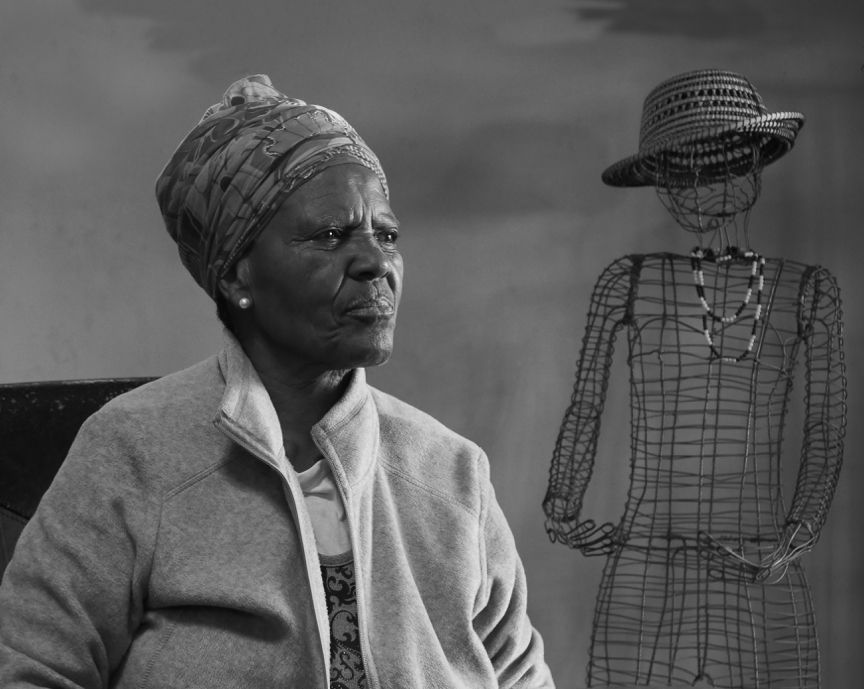
EMbo is the historical name given to several ancestral places both ancient and contemporary, inhabited by especially Nguni Bantu. It is both mythical and real in the narrative imagination of shared roots spanning nearly thirty-two generations of orally recounted history. The emergence of the largest clans making up contemporary Xhosa, Zulu, Thonga, Swati and Debe genealogies is regarded as ultimately linked to the eMbo royal lineage. In the song Mantombi is summoning all to ‘go to Embo’… which in a directional conception in time and space would rightly be ‘a return’.
EMbo kuyigama lezindawo eziningi nezisabalele zendabuko yabantu abangabeNguni. Indawo iMbo kwabanye yaziwa njengephupho kanti kwabanye yindawo ekhona eyakhelwe nehlalwayo ngabantu abazalelwa kuyo bayiphile, bayilime, bayihambe baze bafe bembelwe kuyo. Ukuba khona kwayo kungumlando wobukhosi obukhulu besizukulwane esilinganiselwa kwesesamashumi amathathu nambili sabeNguni abakhele uMzansi kulesikhathi sanamuhla. Kulengoma okaMathothiyane umema bonke ukuba kuyiwe eMbo. Loluhambo kungebe asimemela kulo akusilo oluya phambili ekungazini…kepha ngokweqiniso lungolokubuyela emuva ngokwezithiyo zasendabukweni.
All photos and videos by Aryan Kaganof